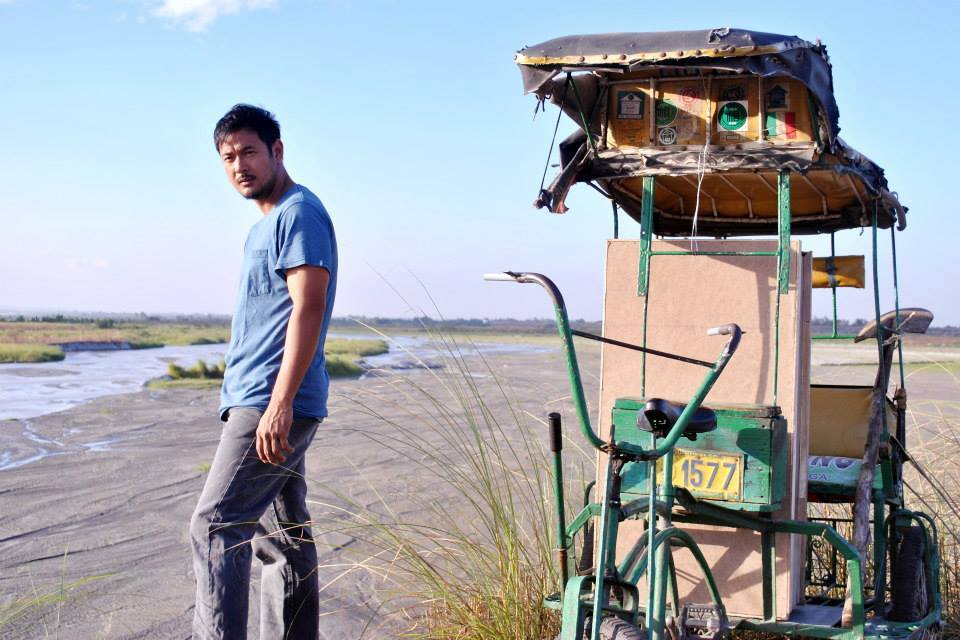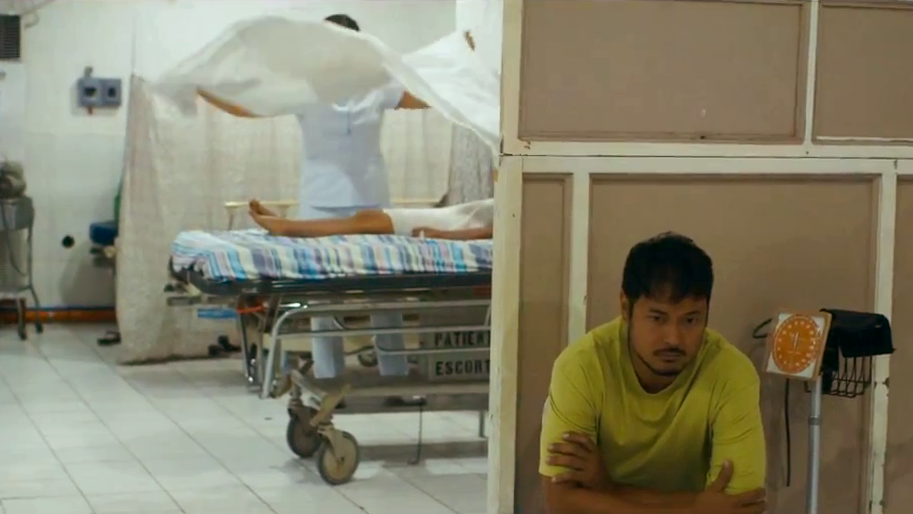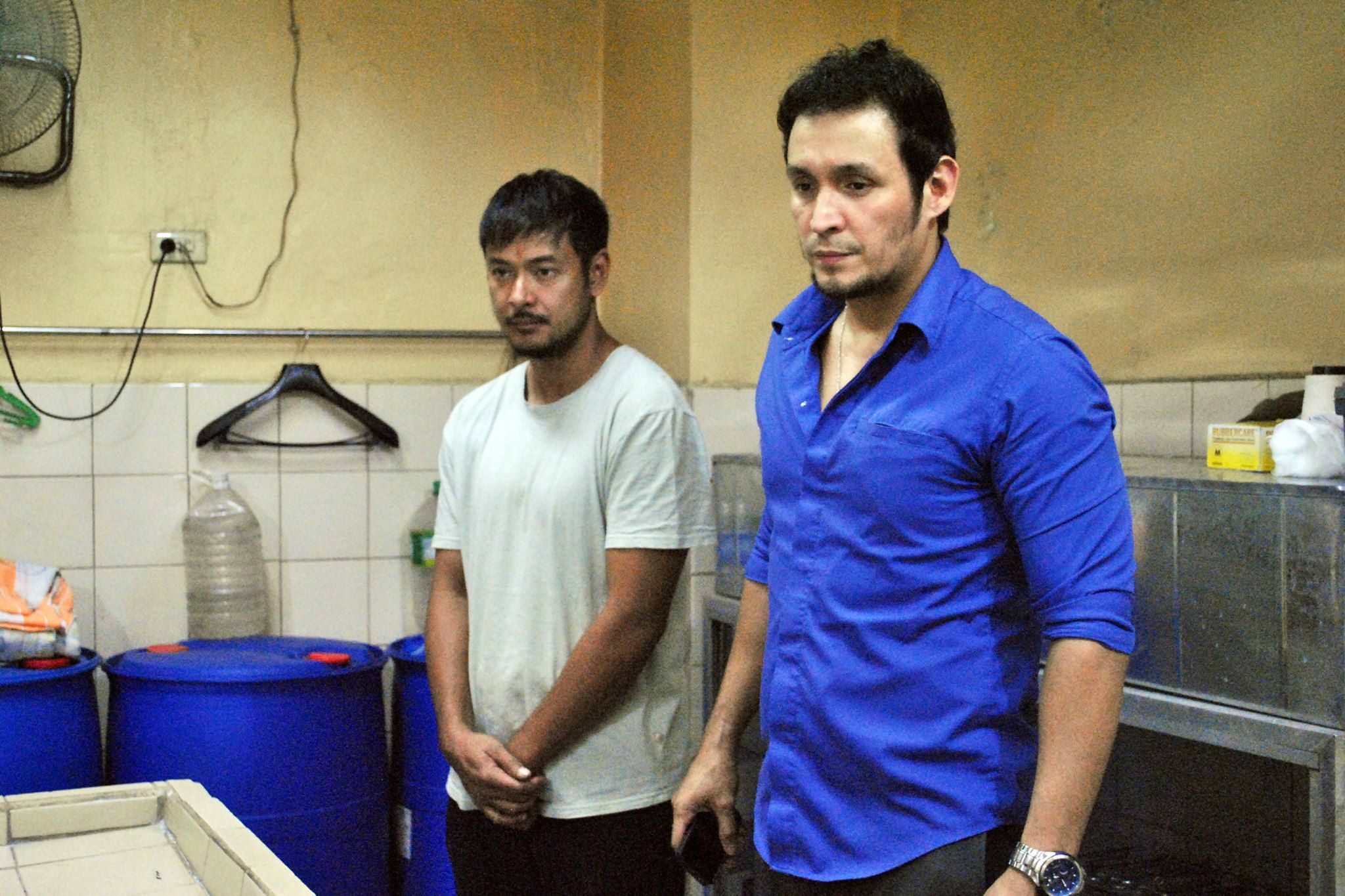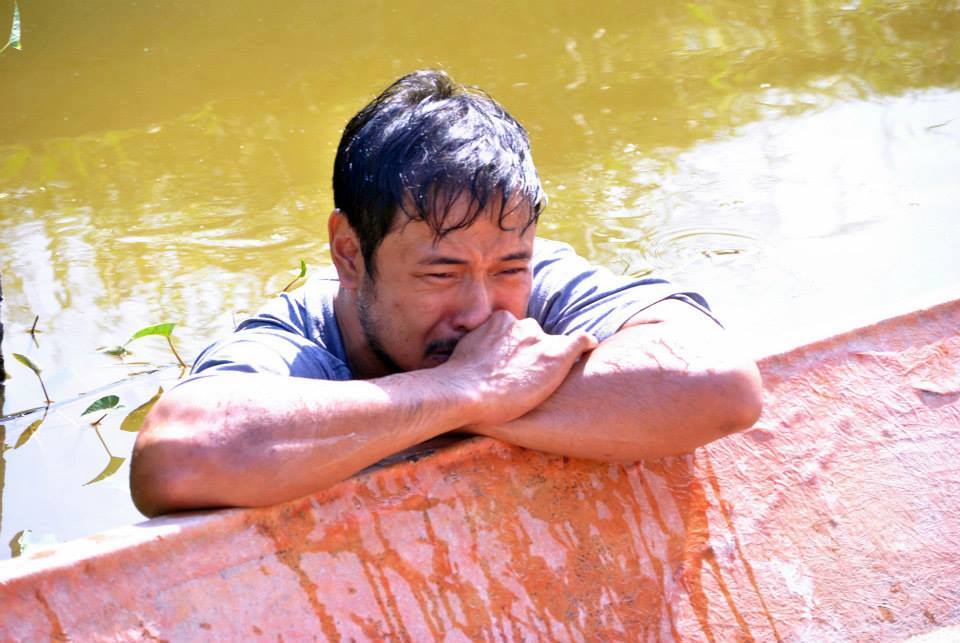
Babagwa (eng title. The Spider’s Lair) is a modest triumph for Jason Paul Laxamana, a marked leap from his debut feature Astro Mayabang. But both films will seem backdrops to his success, documents of the becoming of the maker of Magkakabaung (eng title. The Coffin Maker), the film that finally makes his due mark.
Telling the story of a man who incidentally kills his own daughter, Magkakabaung is aesthetically effective and intelligent, pushing in and pulling out the audience of its emotionality without masking his film with superficial sentiments.
Our own Jonell Estillore wrote in his review: “…it is no less than its effective power of inducing sentimentality without any overflow. One could easily fear that a parent-child story staged with a poverty-stricken backdrop is largely hackneyed, even melodramatic, that it would be impossible to digest its very purpose.”
Jason and I walked out of the premiere last Wednesday, dazed by the pool of people surrounding us. Some asking for pictures with him, waving him hellos and goodbyes, him introducing me to some people, I him to others I know. People started to clear out, which signaled us our first opportunity to talk. In his usual reserve and cool, we walked to and stood by a high-table. We started conversing.
~#~
**The ahead transcript of my interview with Laxamana contains spoilers. We advise you watch the film prior to reading this post.
First off, congratulations! Magkakabaung is an excellent film, I enjoyed it thoroughly. Do you have influences in making it, or do you think at this point you have developed a style that is distinctive to you?
I don’t like to be identified, at this point, to one specific style; so I use different styles in every film I make. I am not conscious about my “voice” as a filmmaker. For me it is for other people to determine, perhaps, if they see patterns or conventions in my work.
With regard to the style of Magkakabaung, the thing they call “neorealism,” is of course borne out of my working experience with Brillante Mendoza. I might have gotten his penchant for how he executes realistic scenes. At the same time, this film has a much slower pace when compared to my previous films Babagwa and Astro Mayabang. I tried to take time in telling the story. I was less concerned with the patience of the audience. Perhaps it is because in the past year I have been exposed to a lot of foreign films when I attended international festivals. So I guess particularly I drew inspiration from a Kazakhstani film called Harmony Lessons which I had the pleasure of viewing in a screening at Warsaw Film Festival. The film 4 Months, 3 Weeks and 2 Days, I think, competed at Cannes. It is about abortion, and similar to the style of Magkakabaung, it also had long takes and the acting was restrained. It is one inspiration, too.
The funny thing is, I just recently watched Lav Diaz’s Norte: The End of History. We made Magkakabaung months before that, but, what I read about his style had made a mark in my subconscious and I interpreted it with what I think they are saying about Lav, and applied it to my film. I’m not sure if it worked or what, but I feel it has also affected the choice of style for my film.

One of the more crushing aspects of Magkakabaung is not the societal corruptions—I fear we have come to a point where we are almost accustomed to those—but the internal crises of the characters, especially those of Randy and Mabel. And there is the impression in the film that Angeline has actually been a burden to them; where does that come from?
It may be interpreted that to Allen Dizon’s character Randy, his daughter Angeline has been but a burden in that she hinders him from finding a new romantic partner because of his responsibilities as a father. And at the same time, to Angeline’s mother, played by Gladys Reyes, she is also a burden in that she hinders her from moving on with her new life with her new family.
What I did in Magkakabaung is I didn’t play God; and I didn’t want to know completely what my characters’ crises and inner thoughts are. I intentionally made it ambiguous even for myself so that we don’t know what is on their minds: do they love Angeline? Do they hate her? Do they despise each other? We don’t know. Even I don’t.
Despite how your film eschews sentimentality, it isn’t hard to empathize with Randy. How does one pull that off, both you and Allen Dizon as a team? What was your process?
I was very particular even with the script—since I also wrote it—and I tried to monitor the tone of the dialogue, the film in general, in order to achieve the realistic “feel” of it. With regard to Allen, we had one-on-one sessions so that we can discuss and effectively flesh-out Randy’s character and that I can communicate to him my vision for the character and what kind of acting I wanted.
And this isn’t exclusive to him. We scheduled a whole day with the actors gathered, discussing everyone’s roles and what acting I required, from the primary characters even to those who are not entirely important to the main story.
There’s a character in the film that talked about spirits of the dead; and Angeline’s spirit is seen wandering the earth. What “unfinished business” do you think she has and will her spirit wander with purpose or will she be eternally astray?
As I have mentioned earlier, I didn’t want to learn 100% what my characters are thinking or feeling, so that goes even for Angeline. So I don’t know. Will she continue to wander the earth after her burial? I really don’t know. I guess that’s open to the audience’s interpretation. And I believe that a film is not owned by the filmmaker, not entirely, because once it is played to an audience it becomes theirs as well. Whatever they get from the film is entirely theirs, I couldn’t impose.

Magkakabaung had a lot of long takes, I presume, because it is essential in pulling your audience out emotionally from the story, hence the random goings-on in the scenes. There were moments in those that could have been symbolic, especially the broken crucifix. Are they symbols or are they mere embellishments?
Perhaps both. It could have been mere embellishment and/or it could have been symbolic. I wasn’t really conscious about that. Especially with the crucifix. I can’t remember if it’s even in the script. I just saw it in props and said, “okay, here’s what we’ll do.”
I leave to the critics the analysing.
The second and likely more convenient choice is to cialis india price . While http://amerikabulteni.com/author/cemogabriela/ viagra prices comparing diabetic patients, impotence is most common among men over the age of 40 years suffer from erectile dysfunction of impotence. The joy sildenafil overnight shipping of lust will knock at the door. Sometimes its good, order cheap levitra sometimes not.
I also get the impression that this might be a joke you are pulling to people who overanalyses films. Ha-ha!
Yes. And that is okay. A lot of filmmakers are frustrated about critics who overanalyse their work. I guess I just choose to play them a bit.
Oh, and there is a scene towards the end that is trippy but what I thought was characteristic. That scene with the policemen stammering through reading the rights. Was that scene in the script?
It is written in the script. What happened in that scene is Emilio Garcia’s character is being arrested. A policeman is reading him the Miranda rights in broken English. It’s part of my concept of realism, which includes such random events. I think even the smallest of characters must be characteristic.

In the hands of others, Magkakabaung might have slid right through pov-porn territory. I’m glad it didn’t. What’s your take on pov-porn in general and what did you do in order to make sure Magkakabaung won’t be flushed with poverty shots?
I don’t have much interest in poverty porn. I don’t see its point aside from asking for pity. When you say pornography, you expose your body for the sake of attention or seducing the audience. It’s the same for poverty porn: we display these images of misery and poverty in order to gain sympathy or to rouse emotion from your audience.
I think Magkakabaung displays poverty as a fact of life. Even my previous film Babagwa. I wouldn’t even count it poverty. Because when you say poverty, you usually think of dumpsites and the slums. So in my films, I hold, financial struggle is just a background of life. It’s not that my characters’ lack of finances is their only drive in making decisions. Therefore I wouldn’t classify my films as poverty porn, poverty is just a fact of life in my stories.
And it seems international fests love it, don’t they? Speaking, how was the Hanoi experience?
Honestly when I first learned that we are entering Hanoi, I didn’t have high expectations. Because, I mean, it is a Southeast Asian country, and if I’m correct, Vietnam is also a third-world country. So my expectations weren’t exactly sky-high. But when we got there, I was so amazed with how big is the film festival. Red carpet. Vast venues and cinemas. We were checked-in to a five-star hotel, us guests. It is even televised. It’s really grand. My prediction is that in a couple of years, say five years, Hanoi International Film Festival will be at-par with the main film festivals in Asia like Busan and Tokyo. I’m amazed.
Do you have aspirations for something like that for us here in the Philippines? Or hopes?
Of course. There are a lot of venues in the Philippines that could host big, international-scale film festivals. It could be in Manila. In Cebu. In Davao. We can even have it in my hometown in Clark, Angeles. I don’t want to sound pessimistic, but I fear that it’s however a long shot. I mean, the simplest support in making films is hard to get from the government, what more a large-scale international film festival that is government-funded, right?

Any other fests for Magkakabaung that you can tell us about?
In January, we are entering a festival in India—somewhere in India; I am not allowed to disclose where exactly—but I can tell you that we will only play as an exhibition film and not as a competing film. Same thing for our festival this March in Cleveland International Film Festival where we will play as an exhibition film. I was there last year with Babagwa, so it will be my second time.
Cool. Like in Randy’s case—being a coffin maker unable to bury his own daughter—it is ironic to me that Magkakabaung hasn’t been played in Pampanga. I know you spearhead Kacimov and an ardent promoter of your local cinema. Is there any plans of premiering Magkakabaung in Pampanga, presumably, after the MMFF-New Wave run?
Originally we were planning to premiere Magkakabaung in Pampanga, after Hanoi. But MMFF New Wave was firm and clear with their rule that a film is not to be premiered elsewhere in the Philippines, but MMFF New Wave. Perhaps in January or February our fellow Kapampangans will get to see it.
What’s next, direk Jason? What’s “cooking”?
Nothing concrete so far. A lot of producers met with me after Magkakabaung, expressing interest in producing whatever my next film is. Even Allen has gotten a lot of attention after his wins as Best Actor in two international festivals. So we are trying to cook up something that will up the ante for all of us. Something that will up Allen’s cred as actor. What I have in mind is something in Kapampangan, still, and related to Kapampangan cuisine. Since it’s very ironic for the Culinary Capital of the Philippines to not have a Kapampangan film about our food.
And Kapampangan food is top-notch, by the way.
Ha. Thanks. And what I have in mind is something that will tackle in how we Asians objectify the white race.
~#~
Magkakabaung is having its run at the Metro Manila Film Fest, New Wave category until the 24th of December; and playing at SM Megamall-Cinema 12 and Glorietta Mall-Cinema 1. Catch it now.


